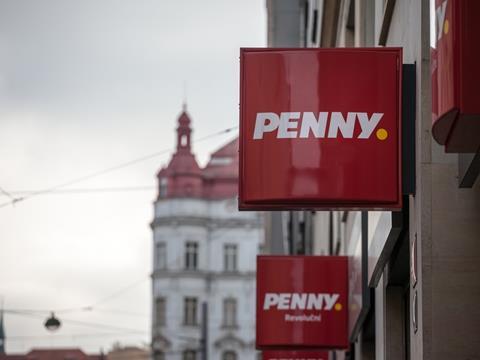
Nestlé Česko, PENNY, and POSpooling are piloting point-of-sale (POS) stands made of wire, which are said to perform five times better than cardboard alternatives when it comes to environmental burden.
Cardboard POS stands are regularly thrown away after two weeks of use in retail applications. Although they are sometimes sorted and recycled, they can also end up in mixed waste.
To solve this problem, Nestlé will display its KOFILA chocolate bars on POSpooling’s circularity-minded racks at ten selected PENNY stores in Czechia, aiming to cut down on unnecessary cardboard waste.
POSpooling’s stands work on a similar shared system to CHEP or LPR pallets, as they can be folded up and returned to a central warehouse for cleaning, repairs, and preparation for further use. They are then rented out to another supplier, which may not operate in the same industry as the previous renter.
A Life Cycle Assessment study commissioned by Nestlé from LCA Studio, states that the wire rack performs up to five times better than cardboard POS stands in terms of environmental burden. As the collaboration aims to roll out a new return logistics process, it is hoped to overcome roadblocks like wood shortages and the further use and recycling of wood-based POS stands, and save time that retail employees would otherwise spend disposing of used cardboard.
“We use a shared pallet system and know how it is not only efficient, but also environmentally friendly as a result,” explains Tomáš Kubík, head of PENNY Communications. “That is why we are happy that thanks to the cooperation with Nestlé Česko and the POSpooling company, we can be the first in retail on our market to also use the solution of shared POS stands.
“We are currently liquidating hundreds of paper stands from promoted products every day. And it’s not just about saving paper and reducing our ecological burden on nature, but also about saving our employees’ time, whether directly in stores or in logistics, and easier handling.”
“PENNY is an ideal partner not only because of the high number of stores, but also because, like us, it perceives sustainability as one of its priorities,” continues Lenka Soal, trade marketing manager at Nestlé. “We want to open and simplify the way to use these racks to all suppliers from food and FMCG companies. The more suppliers that share racks, the lower the impact on the environment and the lower the costs.
“From an economic point of view, the goal is not to increase the current costs associated with the purchase of disposable stands. It is therefore a sustainable solution without a negative impact on costs, which is quite rare.”
Mirka Procházková, managing director of POSpooling, adds: “We show how the applied circular economy can be done in practice. There is a lot of theory everywhere, but only real experience will move us forward.”
In similar news, UBQ Materials expanded its collaboration with PepsiCo last year to produce eco-friendly display stands for Lay’s crisps sold across Europe.
Nestlé has also piloted refillable vending machines for its Milo and Koko Krunch cereals in Indonesia – an effort aimed at reducing disposable packaging in its product lines.
If you liked this article, you might also enjoy:
The L’Oréal approach to packaging sustainability
What steps is Apple taking to make its packaging more sustainable?
How did Brazil achieve its 100% aluminium can recycling rate – and can it be replicated in the EU?
Experts have their say on the EU’s Packaging and Packaging Waste Directive revisions
Also, if you’re interested in packaging sustainability, you will want to attend our Sustainable Packaging Summit in Amsterdam on 14-15 November. The Summit brings together leaders and pioneers from across the industry to align strategically, learn, network, and create a critical mass to accelerate change. You can learn more by clicking here, and you can buy a ticket to attend here.














No comments yet